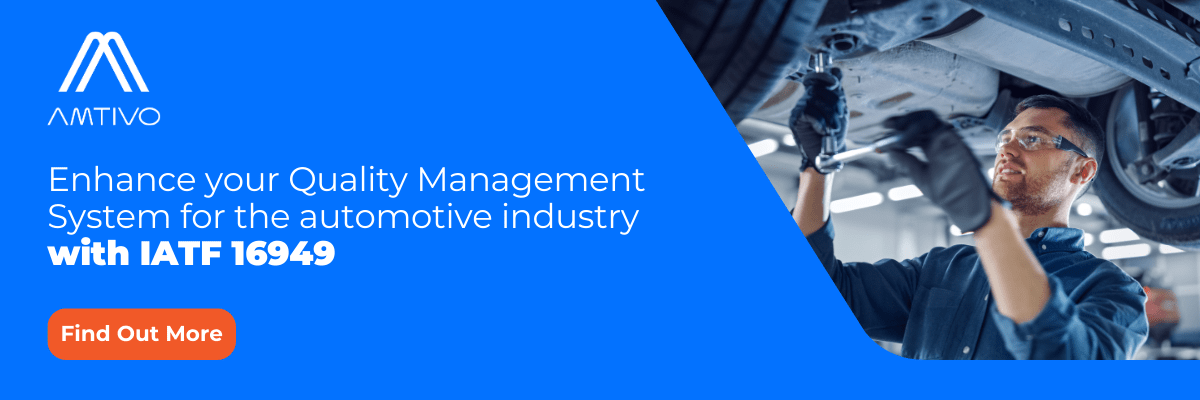In the automotive industry, delivering quality is crucial for a company’s success, whether you’re involved in design, development or manufacturing.
This is why the IATF 16949 standard is so important. Getting certified can help your company improve quality and increase customer satisfaction.
Read on to learn more about IATF 16949, how it can benefit your business, and how the certification process works.
What Is the IATF 16949 Standard?
IATF 16949:2016 is a global standard for managing quality in the automotive industry, created by the International Automotive Task Force (IATF). It is designed to support the highest levels of quality, safety and efficiency in the industry.
IATF 16949 aligns with ISO 9001, incorporating its core principles while adding specific requirements for the automotive industry. It focuses on continual improvement, preventing defects and reducing variation and waste in the supply chain.
This standard applies to all companies that design, manufacture, or supply automotive parts or products. Its goal is to help companies deliver high quality and efficiency throughout the supply chain, boosting customer satisfaction and safety.
By adopting IATF 16949, organizations can demonstrate their commitment to high-quality standards, which is essential in the competitive automotive market.
 |
Why Is the IATF 16949 Standard Important for the Automotive Industry?
The IATF 16949 standard is important for the automotive industry because it helps support consistent quality among manufacturers and suppliers.
Standardizing processes can reduce variation and waste, making operations more efficient and saving money. The standard also focuses on ongoing improvement and preventing defects, which boosts product safety and reliability. This is key to earning customer trust and satisfaction.
Moreover, IATF 16949 supports global trade by offering a unified quality management system, allowing companies to compete internationally on equal terms. Getting certified to IATF 16949 shows your company is committed to quality, making you more appealing to global partners and customers.
What’s the Difference Between ISO 9001 and IATF 16949?
ISO 9001 and IATF 16949 both relate to quality management, however, there are some key differences between them.
While ISO 9001 provides a broad quality management approach, IATF 16949 addresses the unique complexities and demands of the automotive industry.
- ISO 9001 is a general standard for Quality Management Systems (QMS)—The standard applies to any industry and focuses on principles like customer centricity, process approaches, and continual improvement.
- IATF 16949 is specific to the automotive sector and builds on ISO 9001’s framework—The standard adds requirements tailored to automotive manufacturing, such as defect prevention and supply chain management.
8 Key Benefits of IATF 16949
IATF 16949 provides a comprehensive framework for achieving excellence in the automotive industry and certification offers a number of benefits, including:
1. Improved Product Quality and Reliability
IATF 16949 promotes strict quality management processes, which lead to better product quality and reliability. It helps organizations reduce defects, improve safety and produce high-quality products that meet industry standards.
Focusing on quality reduces the number of recalls and warranty claims, improving the reputation of manufacturers and suppliers.
2. Enhanced Operational Efficiency and Reduced Costs
The IATF 16949 standard focuses on consistent processes and continual improvement, which can help reduce waste.
This leads to more efficient operations, reduced production costs and increased profitability. Simplified processes also make resource management easier, helping businesses maximize their supply chain and manufacturing operations.
3. Increased Customer Satisfaction and Loyalty
Delivering consistently high-quality products builds customer trust and satisfaction. Going one step further and exceeding expectations can foster stronger loyalty, leading to organizations gaining a competitive edge in the market.
Satisfied customers are more likely to return to your business and recommend it to others, contributing to long-term business success.
4. Global Recognition and Market Access
IATF 16949 is recognized worldwide, meaning lucrative international trade and partnerships can be easier to secure.
This standard demonstrates an organization’s commitment to quality, making you more attractive to global automotive manufacturers. It also opens up opportunities in new markets and strengthens existing business relationships.
5. Reduced Risk and Improved Compliance
Implementing IATF 16949 helps organizations identify and mitigate risks effectively through thorough documentation and process controls. This can help your business demonstrate compliance with regulatory and industry requirements. As a result, the likelihood of legal issues can also be reduced.
6. Fostering Innovation and Continual Improvement
IATF 16949 encourages a culture of innovation and continual improvement within an organization.
By regularly evaluating processes and striving for improvement, companies can stay ahead of industry trends and technological advancements. This proactive approach can lead to the development of innovative products and solutions.
7. Stronger Supplier Relationships
The standard encourages better collaboration and communication with suppliers, which can lead to more reliable supply chains and fewer disruptions. As a result, your organization can operate more efficiently and cost-effectively.
8. Seamless Integration with Other Standards
IATF 16949 is designed to align with other international standards, making it easier for organizations to build a unified management system. It is fully based on ISO 9001 and incorporates additional automotive-specific requirements, ensuring compatibility and reducing duplication of efforts.
Many companies choose to integrate IATF 16949 with standards like ISO 14001 (Environmental Management) and ISO 45001 (Occupational Health and Safety) to create a comprehensive system that manages quality, environmental impact, and worker safety in a cohesive way. This integrated approach can streamline audits, improve overall performance, and simplify compliance with multiple regulatory and customer requirements.
How to Achieve IATF 16949 Certification
Understand the process for achieving IATF 16949 certification so your organization’s journey can go as smoothly as possible. Here’s an overview of the typical process:
1. Understand the Requirements
Familiarize yourself with the IATF 16949 standard and its requirements. This involves understanding how these requirements align with your current QMS and what changes might be needed.
2. Conduct a Gap Analysis and Prepare Documentation
Start by conducting a gap analysis to identify areas where your current QMS does not meet IATF 16949 requirements. This will help you understand what changes are needed and where best to direct your resources and time for maximum impact.
You will also need to prepare a comprehensive portfolio of documentation that includes quality manuals, procedures and records of changes and previous audits. These documents must align with both IATF 16949 and ISO 9001 standards.
3. Implement the Necessary Improvements
Develop a detailed plan to address the gaps identified. This may involve revising processes, documentation, and quality procedures to align with the standard. Implement the necessary changes, focusing on areas such as defect prevention, risk management, and supply chain quality assurance.
4. Staff Training
At this point, you may benefit from training your team to better understand the IATF 16949 standard and how it applies to your organization. This helps everyone understand their roles in maintaining the QMS.
5. Conduct Internal Audits
Your organization must conduct internal audits to assess the effectiveness of your QMS and how it aligns with IATF 16949 requirements.
Internal audits also help identify any remaining nonconformities and prepare your team for the external audits. Use these audits as a learning tool to continually improve and fine-tune your QMS.
See more on our ‘Understanding The IATF 16949 Audit Process’ article.
6. Select a Certification Body
Choose an IATF-approved certification body that is authorized to conduct IATF 16949 audits. It’s important to select a body with experience in the automotive industry for a credible audit and insights specific to the industry’s quality requirements.
7. Stage 1 Audit
The certification process typically begins with a Stage One Audit, which is a preliminary review of your documentation and readiness for the full certification audit (Stage Two).
8. Stage 2 Audit
The Stage Two Audit is the main assessment where the certification body evaluates the implementation and effectiveness of your QMS against the IATF 16949 standard. This involves a thorough on-site review of processes and records.
Any nonconformities identified during the audit should be addressed promptly.
9. Achieve Certification
Once the audit team is satisfied that your QMS meets the standard’s requirements, they will recommend certification.
The certification body will then decide to grant IATF 16949 certification.
10. Maintain Compliance and Recertification
It is crucial to maintain compliance after achieving IATF 16949 certification. This typically involves conducting annual surveillance audits to check ongoing compliance with the standard. This helps maintain the certification over the typical three-year cycle.
Foster a culture of continual improvement within your organization by encouraging feedback and innovative solutions from all staff members.
Towards the end of the certification cycle, a recertification audit is conducted to renew the certification for another cycle. This involves a comprehensive review similar to the initial certification audit.
Start Your Certification Journey With Us
Are you ready to enhance quality and efficiency and improve your reputation in the automotive space?
Our team of expert auditors provide comprehensive certification services for IATF 16949, supporting you at every step, from the initial gap analysis to the certification audit three years later. Our auditors are committed to ensuring a smooth and transparent certification journey, and while they maintain impartiality in the assessment process, our team is available to answer queries and provide clarity on certification requirements.
As an ANAB-accredited and IATF-approved body, we’re highly experienced and authorized to perform certification audits for several management system standards.
With us, you can feel supported and confident while successfully achieving IATF 16949 certification.
Get a quote today, or contact our team to discuss your needs.




